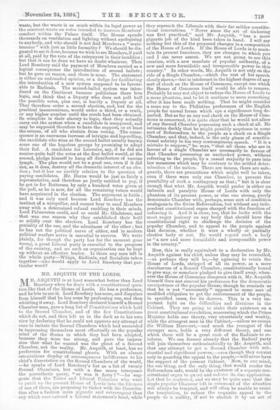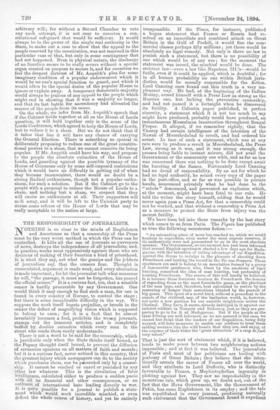MR. ASQUITH ON THE LORDS.
MR. ASQUITH is at least somewhat better than Lord Rosebery when he deals with a constitutional ques- tion like that of the House of Lords. He has a preference, and he lets us see it. Lord Rosebery has none, and disguises from himself that he has none by professing one, and then whittling it away. Lord Rosebery declared himself a Second Chamber man, gave a long list of Constitutions which hold to the Second Chamber, and of the few Constitutions which do not, and then left us in the dark as to his own view by declaring that he could not approve any attempt of ours to imitate the Second Chambers which had succeeded in impressing themselves most effectually on the popular mind of the States in which they had been adopted, because they were too strong, and gave the impres- sion that what he wanted was the ghost of a Second Chamber, not the reality. Mr. Asquith, at least, has no preference for constitutional ghosts. With an almost ostentatious display of contemptuous indifference to his chief's dissertation on the Second Chambers of the world, —he speaks of Lord Rosebery's list as a list of twenty Second Chambers, but with a fine scorn interposes the parenthetic query, " er was it forty P "—he sug- gests that the Tories and Liberal Unionists who want to patch up the present House of Lords- into the likeness of one of them, are proposing to tinker with the Constitu- tion after a fashion more gigantic and extravagant than any which ever entered a Liberal statesman's head, while they reproach the Liberals with their far milder constitu- tional innovations. " Never since the art of tinkering was first practised," said Mr. Asquith, " has a more gigantic job of the kind been taken in hand. I will say nothing but this of the proposed changes in a composition of the House of Lords. If the House of Lords is to main- tain its present functions, they are changes to which you and I can never assent. We are not going to see this creation, with a new mandate of popular authority, of a new and more formidable and irresponsible power in this. country." In other words, Mr. Asquith is not only on the side of a Single Chamber,—which the rest of his speech clearly shows,—but is intolerant in the highest degree of any sort of check on the House of Commons, except one which the House of Commons itself would be able to remove.
Probably he may not object to reduce the House of Lords to a mere phantom, and to let it continue to seem something after it has been made nothing. That he might consider a mere sop to the Philistine preferences of the English people for unreal forms which ape a significance long de- parted. But as far as any real check on the House of Com- mons is concerned, it is quite clear that he would not allow of any Second Chamber possessing such a check at all. He intimates darkly that he might possibly acquiesce in some sort of Referendum to the people as a check on a Single Chamber, and that, indeed, is the only gleam of constitu- tional sobriety in his very contemptuous speech. " It is a mistake to suppose," he says, " that all those who are in favour of a single Chamber are necessarily in favour of that Chamber possessing an unchecked power, without referring to the people, by a casual majority to pass into law measures which may be contrary to the settled deter- mination of the nation. There are means, there are safe- guards, there are precautions which might well be taken, even if there were only one Chamber, to prevent the possibility of such a contingency as that ; " but it is clear enough that what Mr. Asquith would prefer is either an imbecile and paralytic House of Lords with only the phantom of its present power, or else one strong, purely democratic Chamber with, perhaps, some sort of condition analogous to the Swiss Referendum, but without any inde- pendent constitutional organ charged with the function-of enforcing it. And it is clear, too, that he looks with the most angry jealousy on any body that should have the constitutional right to challenge the decision of the popular Chamber, and to appeal to the people against that decision, whether it were a wholly or partially elective body or not. He would regard such a body as " a new and more formidable and irresponsible power in the country."
Now, this is really equivalent to a declaration by Mr. Asquith against his chief, unless they may be reconciled, —as perhaps they will be,—by agreeing to retain the House of Lords, stripped of all its power, as a mere simulacrum of a Second Chamber, constitutionally bound to give way, or somehow pledged to give itself away, when- ever the House of Commons disagrees with it. Mr. Asquith himself does not conceal his preference for the democratic omnipotence of the popular House, though he reminds us that he is not " necessarily " opposed to some sort of modified obligation to get the endorsement of the people, in specified cases, for its decrees. This is a very im- portant light on the difficulties and divisions in the Cabinet. They are going to stake their existence on a great constitutional revolution, concerning which the Prime Minister holds one theory, very uncertainly aid weakly, while the strongest man in the Cabinet,—unless we except Sir William Harcourt,—and much the youngest of the stronger men, holds a very different theory, and one which there will be a great rush of the Radicals to re- inforce. We can foresee already that the Radical party will join themselves enthusiastically to Mr. Asquith, and that any attempt to get a Second Chamber with sub- stantial and significant powers,—even though they consist only in guarding the appeal to the people,—will never have the support of the present Cabinet. Now, to our mind, the one thing, and the only thing, that would render the Referendum safe, would be the existence of a separate con- stitutional organ to guard and enforce its duo application. Let that be neglected, and we may be quite sure that the single popular Chamber left in command of the situation will always be tempted, and will often be unable to resist the temptation, to reduce the requisite appeal to the people to a nullity, if not to abolish it by an act of arbitrary will ; for without a Second Chamber to veto any such attempt, it is not easy to conceive a con- stitutional safeguard that would be sufficient. It would always be in the power of the single real authority in the State, to make out a case to show that the appeal to the people reserved by the constitution, was not reserved in this particular case or that, but only in some contingency that had not happened. Even in physical nature, the discharge of no function seems to be really secure without a special organ created on purpose to secure it, and for ourselves we feel the deepest distrust of Mr. Asquith's plea forsome imaginary condition of a popular endorsement which it would be no one's special function to guard, and which it would often be the special desire of the popular House to ignore or explain away. A temporary democratic majority would always be jealous of any appeal to the people which might end in showing that it was a majority no longer, and that its last battle for ascendency had alienated the masses of the people from its cause. On the whole, we infer from Mr. Asquith's speech that if the Cabinet holds together at all on the House of Lords question, it will hold together only in the sense of the Lords Conference, which agreed to keep the House of Lords, but to reduce it to a sham. But we do not think that if it takes that line it will have any chance of carrying the General Election. There is something so cynical in deliberately proposing to reduce one of the great constitu- tional powers to a sham, that we cannot conceive its being popular. If Mr. Asquith could have his way, and propose to the people the absolute extinction of the House of Lords, and guarding against the possible tyranny of the House of Commons only by some self-imposed restrictions which it would have no difficulty in getting rid of when they became inconvenient, there would no doubt be a strong Radical enthusiasm, though not a. popular enthu- siasm, for such a solution. But if the Cabinet go to the people with a proposal to reduce the House of Lords to a sham, and nothing but a sham, we suspect that they will excite no enthusiasm at all. Their supporters will molt away, and it will be left to the Unionist party to devise some reform of the House of Lards that may be really acceptable to the nation at large.







































 Previous page
Previous page